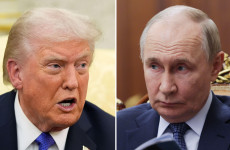Politics
Trump Imposes Major Sanctions on Russia’s Oil Giants Amid Ukraine Tensions

The United States has imposed significant sanctions on Russia’s two largest oil companies, Rosneft and Lukoil, following President Donald Trump’s assessment that Russian President Vladimir Putin was not being “honest and forthright” during recent discussions regarding the ongoing conflict in Ukraine. The announcement was made by US Treasury Secretary Scott Bessent on the evening of March 13, 2024, just a day after a planned summit between Trump and Putin in Budapest was abruptly canceled.
Bessent stated that these sanctions are a direct response to Putin’s refusal to cease hostilities in Ukraine, describing the measures as necessary to hinder the Kremlin’s military funding. “Given President Putin’s refusal to end this senseless war, Treasury is sanctioning Russia’s two largest oil companies that fund the Kremlin’s war machine,” Bessent remarked. He also indicated that the Treasury Department is ready to implement additional actions if required to support Trump’s objectives in resolving the conflict.
This latest move marks a significant escalation in US sanctions against Russia, which Bessent characterized as “one of the largest sanctions that we have done against the Russian Federation.” These measures come after months of Trump holding off on imposing new sanctions, hoping to negotiate peace with Putin despite increasing frustration with the lack of progress.
In the days leading up to the sanctions, Trump expressed optimism about the potential for a ceasefire agreement after a phone call with Putin. However, following the recent developments, his administration appears to have shifted its stance. During an interview with Fox Business, Bessent noted, “President Putin has not come to the table in an honest and forthright manner, as we’d hoped.”
EU Joins US in Imposing Sanctions
The European Union also announced new sanctions aimed at Russia, which include a ban on importing liquefied natural gas from Russia by 2027, blacklisting oil tankers associated with Moscow, and travel restrictions on Russian diplomats. This coordinated response reflects a growing international consensus on the need to hold Russia accountable for its actions in Ukraine.
Trump’s administration has consistently threatened sanctions against Russia since he took office in January, with the aim of bringing an end to the three-and-a-half-year conflict. The recent decision to sanction Rosneft and Lukoil demonstrates a pivot in strategy, moving from dialogue to punitive measures against the Kremlin.
The cancellation of the summit in Budapest was particularly notable, as Trump had previously suggested a meeting with Putin as a way to foster dialogue. However, he later stated that he did not want to engage in a “wasted meeting,” indicating a shift in his approach toward direct negotiations with Russia.
In the aftermath of the sanctions announcement, oil prices surged in after-hours trading, with both the benchmark West Texas Intermediate (WTI) and Brent crude gaining over one percent. This market reaction underscores the significant impact that geopolitical developments can have on global energy prices.
As the situation in Ukraine continues to unfold, the international community will be closely monitoring the implications of these sanctions and the responses from Moscow. The US and its allies are emphasizing the importance of a unified stance against Russia’s actions, as efforts to negotiate peace remain fraught with challenges.
-

 Top Stories1 month ago
Top Stories1 month agoTributes Surge for 9-Year-Old Leon Briody After Cancer Battle
-

 Entertainment3 months ago
Entertainment3 months agoAimee Osbourne Joins Family for Emotional Tribute to Ozzy
-

 Politics3 months ago
Politics3 months agoDanny Healy-Rae Considers Complaint After Altercation with Garda
-

 Top Stories2 months ago
Top Stories2 months agoIreland Enjoys Summer Heat as Hurricane Erin Approaches Atlantic
-

 World3 months ago
World3 months agoHawaii Commemorates 80 Years Since Hiroshima Bombing with Ceremony
-

 Top Stories3 months ago
Top Stories3 months agoFianna Fáil TDs Urgently Consider Maire Geoghegan-Quinn for Presidency
-

 Top Stories1 month ago
Top Stories1 month agoNewcastle West Woman Patricia Foley Found Safe After Urgent Search
-

 World3 months ago
World3 months agoGaza Aid Distribution Tragedy: 20 Killed Amid Ongoing Violence
-

 World3 months ago
World3 months agoCouple Convicted of Murdering Two-Year-Old Grandson in Wales
-

 Top Stories3 months ago
Top Stories3 months agoClimbing Errigal: A Must-Do Summer Adventure in Donegal
-

 Top Stories3 months ago
Top Stories3 months agoHike Donegal’s Errigal Mountain NOW for Unforgettable Summer Views
-

 World3 months ago
World3 months agoAristocrat Constance Marten and Partner Convicted of Infant Murder









